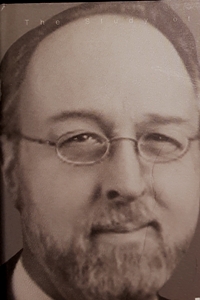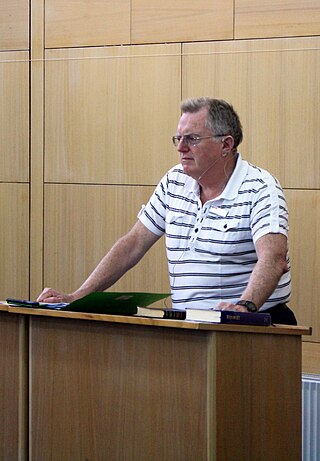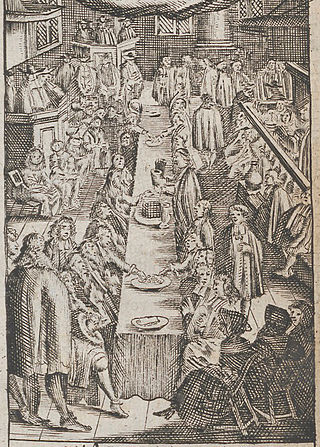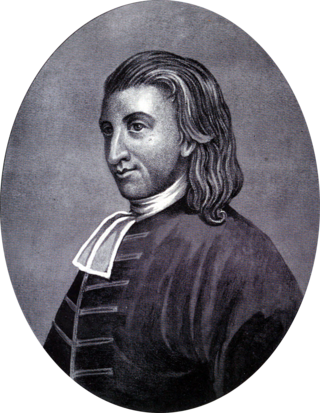Related Research Articles

Calvinism, also called Reformed Christianity, is a major branch of Protestantism that follows the theological tradition and forms of Christian practice set down by John Calvin and various other Reformation-era theologians. It emphasizes the sovereignty of God and the authority of the Bible.

Peter Martyr Vermigli was an Italian-born Reformed theologian. His early work as a reformer in Catholic Italy and his decision to flee for Protestant northern Europe influenced many other Italians to convert and flee as well. In England, he influenced the Edwardian Reformation, including the Eucharistic service of the 1552 Book of Common Prayer. He was considered an authority on the Eucharist among the Reformed churches, and engaged in controversies on the subject by writing treatises. Vermigli's Loci Communes, a compilation of excerpts from his biblical commentaries organised by the topics of systematic theology, became a standard Reformed theological textbook.

Predestination is a doctrine in Calvinism dealing with the question of the control that God exercises over the world. In the words of the Westminster Confession of Faith, God "freely and unchangeably ordained whatsoever comes to pass." The second use of the word "predestination" applies this to salvation, and refers to the belief that God appointed the eternal destiny of some to salvation by grace, while leaving the remainder to receive eternal damnation for all their sins, even their original sin. The former is called "unconditional election", and the latter "reprobation". In Calvinism, some people are predestined and effectually called in due time to faith by God, all others are reprobated.

Heinrich Bullinger was a Swiss Reformer and theologian, the successor of Huldrych Zwingli as head of the Church of Zürich and a pastor at the Grossmünster. One of the most important leaders of the Swiss Reformation, Bullinger co-authored the Helvetic Confessions and collaborated with John Calvin to work out a Reformed doctrine of the Lord's Supper.
Dispensationalism is a theological framework of interpreting the Bible which maintains that history is divided into multiple ages or "dispensations" in which God acts with his chosen people in different ways. The term "dispensationalism" is attributed to Philip Mauro, a critic of the system's teachings in his 1928 book The Gospel of the Kingdom.
Michael Scott Horton has been the J. Gresham Machen Professor of Theology and Apologetics at Westminster Seminary California since 1998, Editor-in-Chief of Modern Reformation (MR) magazine, and President and host of the nationally syndicated radio broadcast, The White Horse Inn. Both Modern Reformation magazine and The White Horse Inn radio broadcast are now entities under the umbrella of White Horse Media.
Hyperdispensationalism, Mid-Acts Dispensationalism or Bullingerism is a Protestant conservative evangelical movement that values biblical inerrancy and a literal hermeneutic. Opponents of hyperdispensationalism are traditional dispensationalists, like John Walvoord and Charles Ryrie, classic Acts 2 Pauline dispensationalists, and ultradispensationalists.
Mid-America Reformed Seminary is a graduate-level theological institution located in Dyer, Indiana, providing a biblical and theological education in the classic Reformed (Calvinistic) tradition. The seminary offers a three-year Master of Divinity degree program for students seeking ordination. A two-year Master of Theological Studies degree is offered for students who desire a theological education without seeking the ordained ministry.
In Protestant Christianity, the relationship between Law and Gospel—God's Law and the Gospel of Jesus Christ—is a major topic in Lutheran and Reformed theology. In these religious traditions, the distinction between the doctrines of Law, which demands obedience to God's ethical will, and Gospel, which promises the forgiveness of sins in light of the person and work of Jesus Christ, is critical. Ministers use it as a hermeneutical principle of biblical interpretation and as a guiding principle in homiletics and pastoral care. It involves the supersession of the Old Covenant by the New Covenant and Christian theology.
Robert Scott Clark is an American Reformed pastor and seminary professor. He is the author of several books, including his most recent work, Recovering the Reformed Confession.
Bryan Chapell is an American pastor and theologian who currently serves as the Stated Clerk of the Presbyterian Church in America. He was previously the senior pastor of Grace Presbyterian Church in Peoria, Illinois. Prior to that he was president and chancellor of Covenant Theological Seminary in St. Louis, Missouri for twenty years. Chapell is also an author, lecturer, and conference speaker specializing in homiletics. He served as Moderator of the Presbyterian Church in America in 2014.

Richard B. Gaffin, Jr. is a Calvinist theologian, Presbyterian minister, and was the Charles Krahe Professor of Biblical and Systematic Theology at Westminster Theological Seminary in Philadelphia, Pennsylvania from 1999 to 2008. He became the Professor Emeritus, Biblical and Systematic Theology in 2008.
W. Robert Godfrey is a minister in the United Reformed Churches in North America and formerly served as the third president of Westminster Seminary California. As of 2017 he is president emeritus and professor emeritus of church history. He currently is chairman of Ligonier Ministries, located in Sanford, Florida, a position he took over from the late Dr. R. C. Sproul.
New Calvinism, also known as the Young, Restless, and Reformed Movement, is a movement within conservative Evangelicalism that reinterprets 16th century Calvinism under contemporary US values and ideologies.

Richard A. Muller is an American historical theologian.

Gerald Lewis Bray is a British theologian, ecclesiastical historian and priest in the Church of England.

In Reformed theology, baptism is a sacrament signifying the baptized person's union with Christ, or becoming part of Christ and being treated as if they had done everything Christ had. Sacraments, along with preaching of God's word, are means of grace through which God offers Christ to his elect. Sacraments are believed to have their effect through the Holy Spirit, but these effects are only believed to accrue to those who have been predestined to have faith in Christ.
Leanne Van Dyk is an American reformed theologian and theological educator. She has focused much of her work on atonement theology and the development of theological education. She is the tenth president of Columbia Theological Seminary.

In Reformed theology, the Lord's Supper or Eucharist is a sacrament that spiritually nourishes Christians and strengthens their union with Christ. The outward or physical action of the sacrament is eating bread and drinking wine. Reformed confessions, which are official statements of the beliefs of Reformed churches, teach that Christ's body and blood are really present in the sacrament, and that believers receive, in the words of the Belgic Confession, "the proper and natural body and the proper blood of Christ." The primary difference between the Reformed doctrine and that of Catholic and Lutheran Christians is that for the Reformed, this presence is believed to be communicated in a spiritual manner rather than by his body being physically eaten. The Reformed doctrine of real presence is called "pneumatic presence".

Republication is form of Christian covenant theology where the works principle of the covenant of works was republished in some way in the Mosaic covenant. The view is popular among academics of the Westminster Seminary California and was popularized by American theologian Meredith Kline. Kline taught that the Mosaic covenant included a typological republication of the covenant of works, where the Israelites had to maintain possession of the promised land by their "typological merit". Republication is similar to the Lutheran views of the Mosaic covenant.
References
- 1 2 "Cornelis P. Venema". Banner of Truth . Retrieved 2 November 2023.
- ↑ "Dr. Cornelis P. Venema Appointed President of Mid-America Reformed Seminary". Reformed Fellowship. Retrieved 2 November 2023.